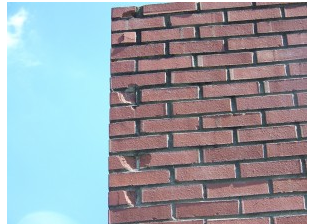Charlotte Home Inspector Answers Questions About..
Charlotte Home Inspector Explains Spalling in Brick Exteriors
 Ever Heard of Spalling? Spalling is deterioration in masonry like brick and or stone products due to moisture absorption or entry. Spalling (Broken or damaged brick surface) is more commonly seen on chimneys and brick exteriors although foundations, retaining walls, sidewalks and driveways are also susceptible.
Ever Heard of Spalling? Spalling is deterioration in masonry like brick and or stone products due to moisture absorption or entry. Spalling (Broken or damaged brick surface) is more commonly seen on chimneys and brick exteriors although foundations, retaining walls, sidewalks and driveways are also susceptible.
Moisture Problems? Chimneys that have moisture problems are normally found to have one or more of the following issues, the most common is that they are missing the rain/snow cap or have cracked chimney crowns and or improper flashings; these are some common causes of moisture entry on chimneys which can result in water entry including the spalling of masonry products. The freeze/thaw cycle of some climates is quick to cause this spalling damage with very little moisture entry required… Locating and correcting the area of moisture entry and repairing chimney brick spalling can be achieved by applying a breathable sealant which can slow or stop the effects of spalling. Have your chimney professionally checked and cleaned regularly as necessary by a qualified chimney sweep.
Chimney water damage is accelerated by deterioration from the freezing and thawing of moisture that has penetrated the masonry surface causing the chimney brick spalling and deterioration. This moisture entry can also cause interior damage to your chimney and possibly home. Clues to look for are: Mortar joints in need of repair, Spalled or broken brick surfaces, rusting inside the fire box or damper assembly. Installing a rain or snow cap with screening is highly recommended not only to protect the inner flu but also the screen acts as a spark arrester and can prevent nesting.
Regular inspection and keeping the chimney crown well maintained and free from cracking and deterioration will ensure good protection from water entry. Most chimney crowns are made with mortar and quickly develop shrinkage cracks. Yearly maintenance will prolong the crowns life.
Brick veneer siding is also subject to spalling deterioration due to moisture. Because brick material is porous it will absorb water like a sponge and can wick moisture right through to the interior. Water proofing products now exist that allow the brick to release moisture but not absorb it. Consulting a reputable professional contractor is highly recommended before attempting any repairs or preventative maintenance.
Vegetation close to or in contact with brick surfaces can increase the brick moisture retention and cause moisture absorption related damages such as spalling and keeping vegetation trimmed back is important to allow ventilation. All other exterior masonry areas, including steps/stoops, patios/porches, walks and driveways can be porous and will allow moisture to be absorbed resulting in spalling. Monitoring these areas and performing preventative maintenance are crucial to prevent deterioration. Keep a watchful eye on these areas on a regular basis.


